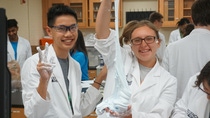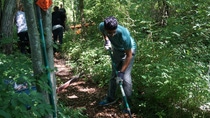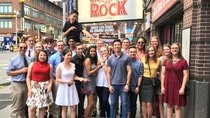Media
They’ve blinded them with science
BASF’s Science Academy gives high school students hands-on experience in chemistry-related careers.

BY ANNA SPIEWAK
Carrie Davis is a 17-year-old junior at Morris Hills High School in Rockaway, N.J. She’s passionate about science, plans to take two physics classes next year and she’s already in a magnet program at her school.
“Physics makes you think in abstract ways,” she said. “You can go down to the tiniest particle, you don’t even know that it’s there, it’s so small.”
She wants to study physics in college and thanks to a BASF educational program, she just might be better prepared to do so.
Davis is one of 20 high school juniors (10 boys, 10 girls) selected out of 76 highly qualified applicants by BASF to take part in the seventh annual Science Academy program this summer.
While many people were hitting the beach, and working on their tans this past July, these rising high school seniors were rolling up their sleeves in a chemistry lab while learning advanced-level science during the two-week program.
Sponsored by BASF and hosted at Fairleigh Dickinson University in Madison, N.J., Science Academy is an on-campus residential program that gives high school students a preview of college living and prepares them for a potential career in STEM (science, technology, engineering and mathematics).
Teenage interest in STEM continues to rise, according to a new report by ACT, the testing giant. The report finds that 49 percent of the 1.9 million graduating high school seniors who took the ACT exam in 2015 expressed an interest in majoring in STEM fields and are academically ready to endure first-year STEM classes in college.
The growing interest in STEM is no surprise, considering the rise in technology and the attractive salaries for college grads pursuing that field. Many students focused on STEM careers, however, appear to be at a disadvantage, as most of them don’t possess strong backgrounds in science and math before heading to college, according to the study.
Science and engineering jobs are key to economic competitiveness in a continuously globalized world and these industries of ample size and quality are crucial for a modern-day economy to prosper.
Science Academy is a collaboration of BASF and FDU, which gives these aspiring scientists a leg up on their peers by preparing them for the scientific real world while giving them hands-on experience of college life of a chemistry student at FDU.
“The interactive program allows students to ask their burning questions as they are making the most important decisions of their lives,” said Molly Borst, Manager, Science Education – North America, BASF, who manages the program. “It gives them an opportunity to interact with university professors in business and science disciplines, graduate and undergraduate students pursuing both science and business degrees and several employees at BASF.”
The curious rising high school seniors arrived July 8 at the FDU campus from all parts of the nation and beyond this year, including Canada, Mexico and Puerto Rico. The following day, the students went straight to work during Chemistry Bootcamp, which gave them “the foundational knowledge required to allow them to progress through the program and develop their own products,” said Mohammed Elshaer, Ph.D., professor of chemistry at FDU who led the crash course boot camp.
“STEM majors are challenging and test all of students’ abilities. The experience Science Academy students have gained is invaluable,” Elshaer added. “They had the opportunity to sit through university-style lectures and were responsible for learning the large volume of material each contained – this is what they should expect from day one as STEM majors.”
Later in the week, during lessons titled From Molecules to Marketplace, students worked in teams and created their own personal care products, developed a marketing plan and package and finally presented their final products to a team of BASF leaders at the North America corporate headquarters. They’ve learned hands-on about polymers, surfactants and emulsions while making products such as body lotion, hair gel, shampoo and lip balm.
“Before Science Academy I did not know what the different types of UV radiation did to DNA in skin cells,” said Nikki Borglin, 17, of Nation Ford H.S. in South Carolina. “I’ve learned how polymers move and form intermolecular bonds to change a substance's physical properties.”
Aside from spending their time in a lab, the students also took part in lectures, visited a BASF site, went to a cosmetics company for background research, did some environmental work, and even went to dinner and a Broadway show in The Big Apple.


In addition to learning about advanced chemistry, the students also got to interact with similar-minded students from different parts of the country, giving them a worldlier perspective on the field.
“I liked the regional diversity of the participants and we were exposed to more applicable parts of science, making things that are tangible such as body lotion, hair gel and fragrance.” added Daniel Wang, 16, from Canyon Crest Academy in California.
All 20 students got three college credits upon finishing the program, the equivalent of one elective course at most colleges and universities.
“Providing students access to high-quality learning opportunities in STEM is a priority,” said Robin Rotenberg, Vice President of Corporate Communications, BASF, in a prepared statement. “This two-week academy continues to play an important role in the students’ enduring appreciation of science and will serve as an inspiration to pursue higher education and a career in STEM.”
To learn more about Science Academy, go on the program’s Facebook page.
For media inquiries or to repurpose this article, please contact: anna.spiewak@basf.com or laura.partynski@basf.com.